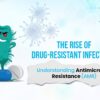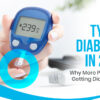Panic Attack, causes, prevention, and treatment options
A panic attack is characterized by unexpected anxiety, intense emotions, and extreme responses to daily, non-threatening circumstances. In a panic attack, a person can sweat profusely, have trouble breathing, and feel as though they are in for a heart attack. A panic attack can hit someone at any moment. Even so, the following are some of the factors that may trigger a panic attack:
Sex: Women, on the other hand, are more likely than men to suffer from panic attacks.
Age: Panic attacks can occur in people of any age group. Panic attacks, on the other hand, usually begin in early adulthood.
How can you tell the difference between panic and anxiety disorders?
Panic attacks are brief bursts of extreme fear or dread that occur for a short period of time. They’re related to the factors listed below:
1.Fear that comes at once.
2.Chest pain.
3.Chills or hot flashes.
4.Sweating
5.Palpitations
6.Numbness on limbs or whole body
7.Difficulty breathing.
8.A coughing sensation.
9.Fear of death.
10.Shaky.
11.Feeling dizzy
Panic disorder and panic attacks are two separate things. Repeated panic attacks are a symptom of panic disorder. These attacks are normally followed by a persistent fear of getting further panic attacks and, in most cases, minimizing situations that could cause or remember previous panic attacks. Panic disorders do not trigger all panic attacks. Other factors that can induce a panic attack include:
1.Congestive Heart failure
2.social anxiety
3.Low blood sugar
4.Post-traumatic stress syndrome
5.Agoraphobia
6.Click-murmur syndrome
7.Hyperthyroidism
Generalized anxiety disorder is characterized by excessive, unreal concern that lasts at least 6 months. It’s related to at least 3 of the symptoms listed below:
1.Tension in the muscles
2.Tiredness
3.Changes in personality, such as being less social
4.Concentration issues
5.Disruptions in sleep
6.Restlessness
7.Irritability or outbursts of rage
Phobia disorders are characterized as recurrent and serious fear of a specific object or circumstance. A panic attack could be triggered by being exposed to certain objects or circumstances. Agoraphobia and social phobia are instances of phobia disorders.
A series of emotional responses are detailed in post-traumatic stress disorder. These reactions can be caused by a variety of factors, including:
1.Earthquakes, floods, explosions, injuries, and other near-death experiences, and death.
2.Encounters that put one’s or another’s health in jeopardy.
Traumatic events can manifest in a person’s thoughts and thinking. Feelings of horror, powerlessness, and terror are re-experienced in the circumstances. The following are examples of common behaviors:
1.Being too cautious
2.Sleeping problems
3.Having a general feeling of doom and gloom, as well as reduced emotions
4.Keeping away from individuals, events, or locations associated with the triggering event
5.Concentration issues
Panic attacks are caused by a variety of factors.
The root causes of panic attacks vary from patient to patient, and it’s possible that no single cause can be established. The brain and nervous system, on the other hand, are thought to play a significant role in coping with anxiety or fear in a particular situation. The following factors raise the probability of experiencing a panic attack.
Problems with Mental Health: Panic attacks are more common in people who suffer from depression, mental disorder, or anxiety.
Problems of substance abuse – Drug use and alcohol abuse raise the risk of a panic attack.
Family history of panic disorders – Panic disorders usually run in families.
Panic attacks hit unexpectedly and last for a long time. Approximately 10 mins after the start of a panic attack, signs emerge. Even so, once the fear mode has gone, these will easily vanish as well.
What approaches are used to identify panic disorders?
Some important health conditions, such as heart failure, respiratory disorders, and thyroid issues, have signs that are close to panic attacks. A health professional will conduct examinations to determine the precise cause of health conditions. As a result, the medical professional will determine if the signs are caused by a physical condition or a panic disorder.
The following are some of the most common causes of panic attacks:
1.Worry about getting many panic attacks or the repercussions of experiencing more panic attacks.
2.To prevent circumstances that cause a panic attack, alter your actions.
3.Remember what it’s like to lose control during a panic attack.
What are the possible side effects of a panic attack?
People are often hesitant to seek treatment for panic attacks, but panic attacks are easily treatable. If panic attacks or a condition are not handled, they may interfere with everyday life and can lead to other problems.
How can you cope with a panic attack?
There are some practical treatment methods for reducing and eventually eliminating panic attacks. The following are the treatment options for panic disorder: medicine, psychotherapy, or a mix of the two:
Antidepressants – Antidepressant drugs can help to minimize the occurrence and intensity of panic attacks.
Psychotherapy- Talk therapy or cognitive behavioral therapy are two forms of psychotherapy in which a healthcare practitioner talks about a patient’s emotions and feelings. The healthcare professional determines the trigger areas and provides therapy to help you resolve them.
Anti-anxiety drugs – Benzodiazepines are among the most commonly prescribed anti-anxiety drugs by doctors to treat and avoid panic attacks. The length of therapy is determined by the seriousness of the condition and the patient’s response to it. The feeling of a panic attack is close to that of a heart attack. Although nearly all panic attacks last for around 10 minutes, a heart attack can last much longer. If you think you’re having a panic attack, go to the closest healthcare facility right away.
Conclusion
Panic attacks can be excruciatingly painful and difficult, both physically and psychologically, in some cases. They can disrupt your schedule and harm your mental health. Seeking treatment as soon as possible will help you stop panic attacks in the future. Signs like chest pain, difficulty breathing, palpitations, dizziness, and fatigue must not be related to anxiety without a doctor’s examination.









